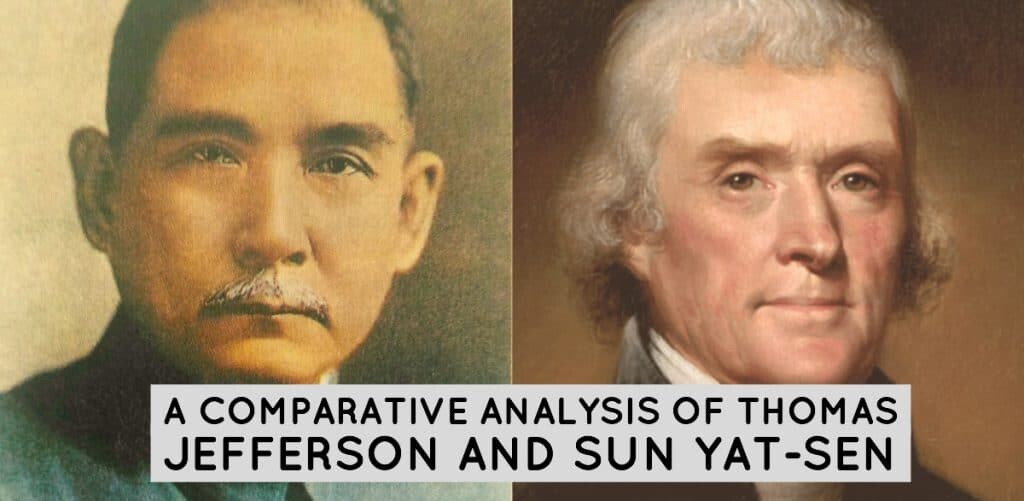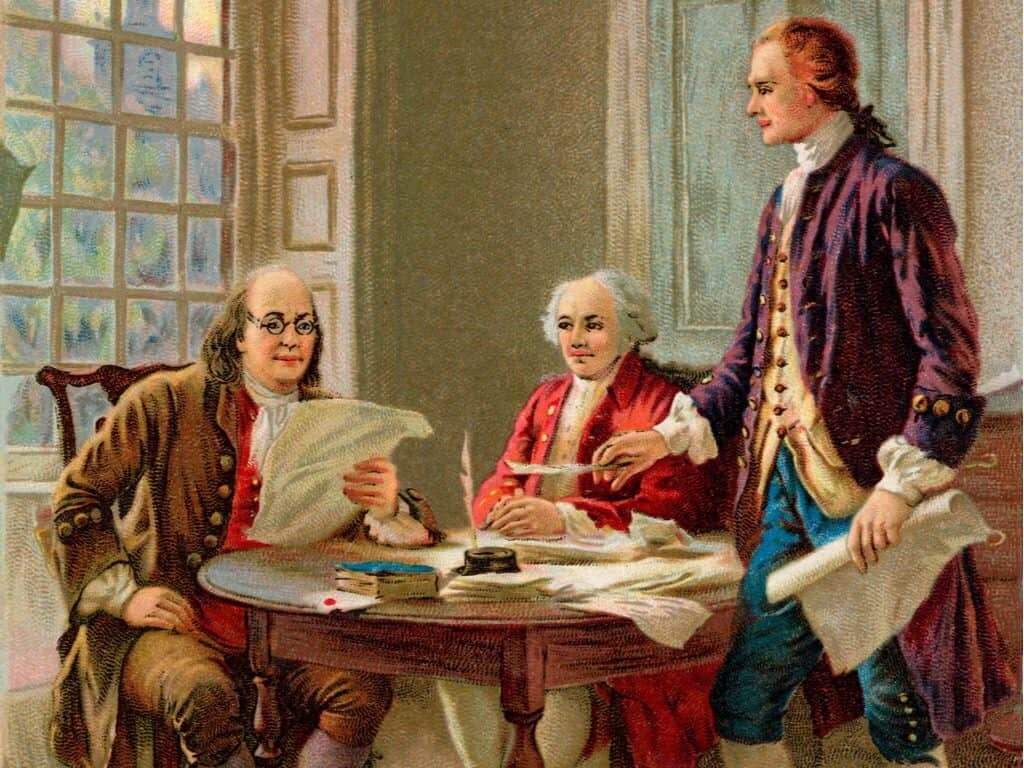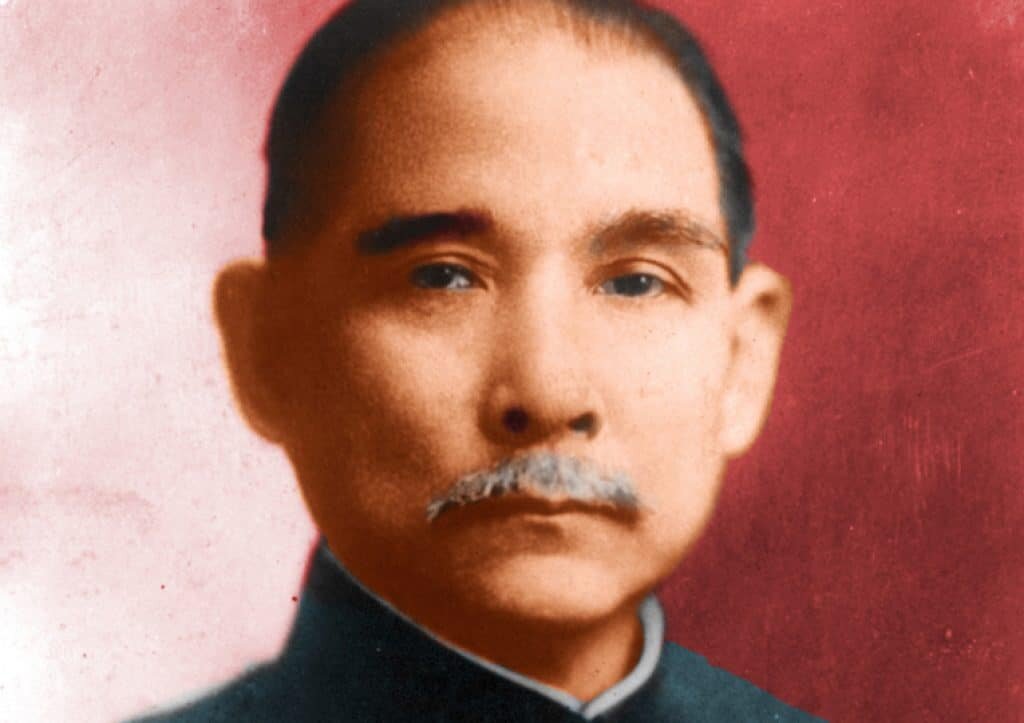In studying the lives and works of Thomas Jefferson and Sun Yat-Sen, it becomes clear that keen insight and monumental achievements do not always indicate a paragon of virtue. Few people in history have represented the forcefulness of their belief in the equality of man. It has been said of both these leaders that they had feet of clay. They were a paradox in many aspects of their lives, but their positive deeds far exceeded their human limitations.

Both were involved in a revolution dedicated to their beliefs in the need to fight against tyranny. Although their early lives were remarkably different, there were many important similarities.
Similarities
Jefferson challenged King George as well as the British Empire. In so doing, he placed himself in personal danger.
Sun Yat-Sen, with only a small army to back him up, was able not only to destroy the very powerful Qing Dynasty but the five-thousand-year-old governmental structure to establish the Republic of China. He became what was to be known as “The Father of Modern China.”
For both Thomas Jefferson and Sun Yat-Sen, there were more military failures than successes, but in both instances, ultimate victory. In both instances, the post-war years brought with it many problems that required compromise, duplicity, and pragmatism. In Jefferson’s strong belief in the dignity of all mankind, he had to give way to his fellow leaders on the subject of slavery. Both men were firmly dedicated to the belief in the freedom and equality of mankind universally.
Few in history were as intelligent or as well educated. Jefferson was as thoroughly educated as it was possible during his lifetime. Sun Yat-Sen became a medical doctor but chose to become a freedom fighter.
Neither were essentially dynamic but did have the ability to choose associates from within the ranks of those who possessed the strength that they might have lacked. Both were pragmatic in the extreme.
Both Jefferson and Sun Yat-Sen was to become world travelers and attempt to gain more knowledge and experience as it pertained to their newly established nations.
Differences
Jefferson’s successes came in the form of articulation with his ability to present his thoughts and beliefs to the printed page.

Sun Yat-Sen was a schemer, a contriver and one who would do anything to satisfy what he believe to be necessary. Was his conversion to the Christian religion undertaken out of strong beliefs or just another way to satisfy his goals? Was his forged birth certificate indicating his desire to pawn himself off as an American citizen a genuine effort or a devious undertaking?
A Closer Look at Thomas Jefferson

In the years following the respective revolutions in both America as well as in China, there were conditions leading to anarchy. Washington appointed Jefferson Secretary of State. This lead to a chaotic relation between the factions of Jefferson and the Republicans on one hand and Hamilton and John Adams representing the Federalists on the other. In a pouting mood, Jefferson went home. This was typical of his behavior. His outward manifestation was to withdraw and sulk. Privately, he was regrouping so that he could return and fight another day.

Jefferson announced his bid for President against John Adams. He lost, and as was the case at that time, became Vice President. Four years later he ran again. Leading up to the election there was rancor, anger, and hostility never seen before. Adams people stated that anyone who voted for Jefferson was voting against God. Jefferson answered with vicious vituperations. The unknown dark side of Jefferson began to come to the foreground. America was nearly experiencing a second revolution.
You May Also Like: Mysterious Death of Meriwether Lewis
Fate intervened on the side of Jefferson. Out of the blue, Napoleon Bonaparte offered to sell his holdings in America. Jefferson was admonished for the purchase, but at that time virtually anything he did would be strongly disliked by his opposition. There is no doubt, however, that he was a successful President.
In his private life, Jefferson manifested behavior that needed to be covered up by his powerful associates.
A Closer Look at Sun Yat-Sen
The life of Sun Yat-Sen was like an action-filled novel. The resolution of the struggle in China for independence made it necessary for Sun Yat-Sen to address exceedingly thorny issues. Like America, there was chaos. He would identify with the Communists, with Chiang Kai-Shek, or with any group that would serve his purpose.

An important lesson can be learned that any major change will virtually always lead to major adjustments often bringing about conditions of greater disharmony than those experienced previously. The characteristics of ruthlessness on the part of revolutionary leaders are by no means unusual, and, interestingly enough, a positive feature to find a suitable path.
Thomas Jefferson and Sun Yat-Sen, living just over 100 years apart, shared similar experiences with their skills and unique circumstances. Many believe that both China and America benefited enormously from their dedication to the value of human life.